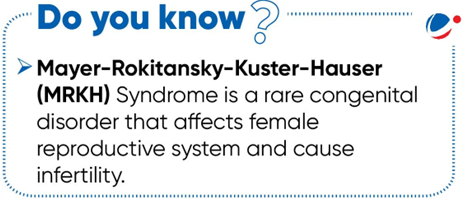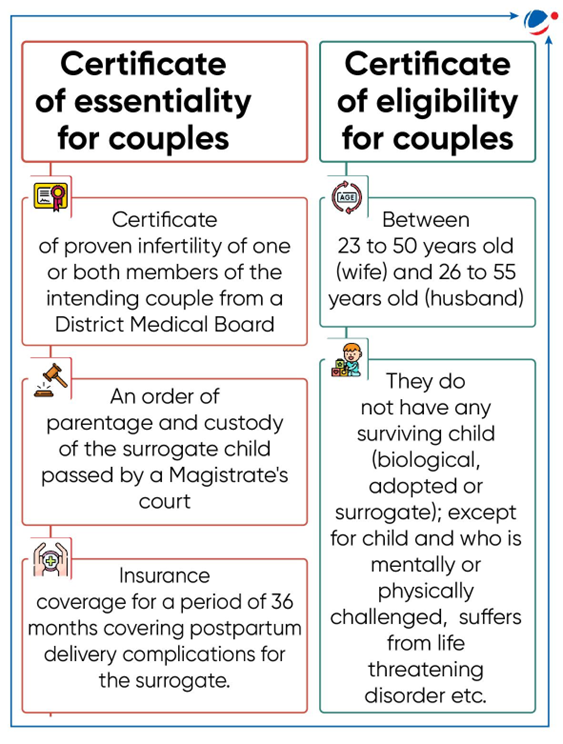Why in the news?
Ministry of Health and Family Welfare notified Surrogacy (Regulation) Amendment Rules, 2024 amending the Surrogacy (Regulation) Rules, 2022.
Surrogacy (Regulation) Rules, 2022
- Background
- An amendment to Surrogacy (Regulation) Rules 2022 in March 2023 prohibited the use of donor gametes and required both the male and female gamete must come from the intending couple.
- In October 2023, Supreme Court in the Arun Muthuvel vs. Union of India case allowed a woman with Mayer-Rokitansky-Kuster-Hauser (MRKH) Syndrome to undergo surrogacy with a donor egg.
- The Court said that Amendment impends the intending couple from achieving parenthood through surrogacy are and is prima facie contrary to objective of the Surrogacy (Regulation) Act, 2021.

- Recent Amendment: The 2024 Amendment to Surrogacy (Regulation) Rules, 2022 allow surrogacy using a donor gamete.
- Benefits of this provision could be availed if District Medical Board certifies that either of the intending couples suffers from a medical condition necessitating the use of a donor gamete.
Types of Surrogacy
|
Surrogacy (Regulation) Act, 2021
Surrogacy is regulated in India as per Surrogacy (Regulation) Act, 2021 and rules framed under this act.
Key features of the Act
- Defines surrogacy: Surrogacy refers to a practice whereby one woman bears and gives birth to a child for an intending couple with the intention of handing over such child to the intending couple after the birth.
- Regulation of surrogacy:
- Prohibits commercial surrogacy but allows altruistic surrogacy.
- Provides for compulsory registration of surrogacy clinics.
- Surrogacy is permissible when it is,
- for intending couple having a medical indication necessitating gestational surrogacy
- for altruistic surrogacy purposes
- not for producing children for sale, prostitution or any other form of exploitation.
- for any condition or disease specified through regulations.
- Eligibility criteria for surrogate mother
- A willing & married woman between the ages of 25 to 35 years having a child of her own.
- No woman shall be a surrogate mother more than once in her lifetime.
- Should possess a certificate of medical and psychological fitness for surrogacy from a registered medical practitioner.
- Eligibility criteria for couples: The intending couple should have a ‘certificate of essentiality’ and a ‘certificate of eligibility’ issued by the appropriate authority.

- Under the act, an Indian woman who is a widow or divorcee between the ages of 35 to 45 years can also avail the surrogacy, subject to the fulfilment of other conditions.
- Rights of surrogate child: Child born out of surrogacy is deemed to be a biological child of the intending couple or intending woman with entitlement to all the rights and privileges available to a natural child.
- Prohibition of abortion: No person, organisation, surrogacy clinic, laboratory or clinical establishment of any kind shall force the surrogate mother to abort at any stage of surrogacy except in such conditions as may be prescribed.
- National Assisted Reproductive Technology and Surrogacy Board: Minister of Health and Family Welfare as chairman. Its functions include to:
- Advise the Central Government on policy matters relating to surrogacy;
- Review and monitor the implementation of the Act,
- Lay down the code of conduct of surrogacy clinics;
- Set the minimum standards of physical infrastructure, laboratory and diagnostic equipment and expert manpower to be employed by the surrogacy clinics;
- Oversee the performance of various bodies constituted under the Act;
- Supervise the functioning of State Assisted Reproductive Technology and Surrogacy Boards.
- State Assisted Reproductive Technology and Surrogacy Boards: Constituted at the State level and Union territory having Legislature.
Issues associated with surrogacy regulation framework in India.
- Complete ban on commercial surrogacy: This may relegate commercial surrogacy to an underground unlicensed business.
- Also, the ban on commercial surrogacy denies women the use of their reproductive ability for monetary gain.
- In Devika Biswas vs. Union of India (2016), the Supreme Court held that Article 21 includes the reproductive rights of a person.
- Limited Availability: Finding altruistic surrogates willing to undergo the process can be challenging.
- Reinforces Patriarchal norms: Altruistic surrogacy may lead to coercion of women (particularly vulnerable ones) within families, to become surrogates.
- Thus, it reinforces patriarchal control over the reproductive choices of a woman.
Way forward
- Awareness: To eliminate the exploitation of surrogate mothers they need to be made aware of their rights and the associated risks to gain their informed consent.
- Clarity: There is a need to clearly define terms such as close relatives, infertility etc. Also, the definition of infertility should be expanded to take into account the medical factors, and diseases of the intended parents.
- Reduce the age limit: For intending womenwho intend to avail surrogacy from a minimum of 35 years.
- Make more inclusive: The possibility to include unmarried women, same-sex couples, and unmarried and single men from availing of surrogacy should be explored.







